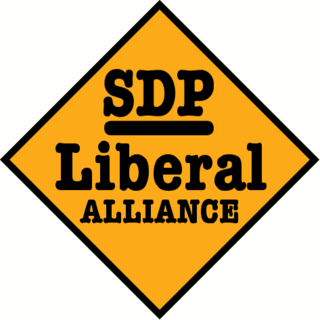Related Research Articles

Roy Harris Jenkins, Baron Jenkins of Hillhead, was a British politician and writer who served as the sixth President of the European Commission from 1977 to 1981. At various times a Member of Parliament (MP) for the Labour Party and the Social Democratic Party (SDP), and a peer for the Liberal Democrats, he was Chancellor of the Exchequer and Home Secretary under the Wilson and Callaghan Governments.

The 1983 United Kingdom general election was held on Thursday 9 June 1983. It gave the Conservative Party under the leadership of Margaret Thatcher the most decisive election victory since that of the Labour Party in 1945, with a majority of 144 seats and the first of two consecutive landslide victories.

The SDP–Liberal Alliance was a centrist and social liberal political and electoral alliance in the United Kingdom.

The Scottish Labour Party (SLP) was a socialist party in Scotland that was active between 1976 and 1981. It formed as a breakaway from the UK Labour Party. It won three council seats in 1977 but lost its MPs at the 1979 election and was dissolved two years later.

William Thomas Rodgers, Baron Rodgers of Quarry Bank, is a British politician and life peer. As a Labour Party member of Parliament, he served as Secretary of State for Transport from 1976 to 1979, and was one of the "Gang of Four" of senior Labour politicians who defected to form the Social Democratic Party (SDP). He subsequently helped to lead the SDP into the merger that formed the Liberal Democrats in 1988, and later served as the party's leader in the House of Lords between 1997 and 2001.

The Liberal Party is a liberal political party in the United Kingdom that was founded in 1989 as a continuation of the original Liberal Party by members who opposed its merger with the Social Democratic Party (SDP) to form the Liberal Democrats. The party holds six local council seats. The party promotes a hybrid of both classical and social liberal tendencies.

The Green Party, also known as the Green Party UK, was a Green political party in the United Kingdom.

The Social Democratic Party (SDP) is a political party in the United Kingdom, established in 1990. The current party traces its origin to the Social Democratic Party, which was formed in 1981 by a group of dissident Labour Party Members of Parliament (MPs) and former Cabinet members Roy Jenkins, David Owen, Bill Rodgers and Shirley Williams, who became known as the Gang of Four. The original SDP merged with the Liberal Party in 1988 to form the Liberal Democrats, but Owen, two other MPs and a minority of party activists formed a breakaway group also called the Social Democratic Party immediately afterwards. That continuing party dissolved itself in the aftermath of a by-election in Bootle, in which the party's candidate received fewer votes than Screaming Lord Sutch's Official Monster Raving Loony Party. However, some SDP activists met and voted to continue the party in defiance of its National Executive, leading to the creation in 1990 of the current Social Democratic Party under the leadership of the candidate who lost that by-election. The party has been led since 2018 by William Clouston.

The Social Democratic Party (SDP) formed in 1988 was a political party in the United Kingdom led by David Owen, which lasted for only two years. A successor party to the original Social Democratic Party (SDP), it was known informally as the 'continuing' SDP.
The 1982 Social Democratic Party leadership election was called following the formation of the Social Democratic Party (SDP). The party had been founded by the Gang of Four the previous year and had rapidly built up its membership, but lacked a formal leadership structure. Each of the Gang of Four was regarded as coequal leader.
The Croydon North West by-election took place on 22 October 1981. It was caused by the death of Conservative Member of Parliament Robert Taylor on 18 June 1981.
Michael Stuart Thomas is a former British politician, identified with the Labour Party until 1981 and thereafter with the Social Democratic Party (SDP). He became well known for his role in both the establishment of the SDP and then in the SDP's subsequent demise. The SDP's leader, Roy Jenkins, referred to Thomas as the "pint-sized Pavarotti", on the basis of his stocky build and beard together with his ebullient manner.
Parliamentary by-elections in the United Kingdom occur when a Member of Parliament (MP) vacates a House of Commons seat during the course of a parliament.

The 1982 Beaconsfield by-election was a parliamentary by-election held on 27 May 1982 for the House of Commons constituency of Beaconsfield in Buckinghamshire.
The Mitcham and Morden by-election was held on 3 June 1982. It was a rare example of a governing party gaining a seat in a by-election.

The 1982 Glasgow Hillhead by-election was held on 25 March 1982. The by-election was caused by the death of the Conservative Party Member of Parliament for Glasgow Hillhead Tam Galbraith on 2 January 1982.

The 1981 Warrington by-election was held on 16 July 1981.

The 1981 Crosby by-election was a by-election held in England on 26 November 1981 to elect a new Member of Parliament (MP) for the House of Commons constituency of Crosby on Merseyside. It followed the death of Crosby's MP Sir Graham Page, of the Conservative Party.

Charles Gilchrist Brodie, better known as Chic Brodie, was a Scottish politician. He served as a Scottish National Party (SNP) Member of the Scottish Parliament (MSP) for the South Scotland region from 2011 until 2016.

The Social Democratic Party (SDP) was a centrist to centre-left political party in the United Kingdom. The party supported a mixed economy, electoral reform, European integration and a decentralised state while rejecting the possibility of trade unions being overly influential within industrial relations. The SDP officially advocated social democracy, and unofficially for social liberalism as well.